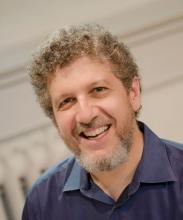By Todd London
When we read or see plays, we look more intensely at the world beyond those plays. Works of theatre raise questions about that world, shed light into dark spaces, or, to use the painter Francis Bacon’s phrase, “deepen the mystery.” Similarly, when we think about training theatre artists and scholars, we look beyond the classroom to the theatre as a whole. How does the theatre sit in our lives and culture, and what are the questions students need to ask of it? What do they need to know to bring illumination to the dark or to enhance the mysteries of living? And what preparation do these talented students need to face the new—and ever-newer—century?
As educators, we do our best to frame the questions, despite the awareness that the future is, itself, unknowable.
As educators, we do our best to frame the questions, despite the awareness that the future is, itself, unknowable. Think about it. This time last century—in 1914 America, when things we take for granted, like aerial bombing and women’s right to vote, hadn’t begun—almost nothing of what we take for granted about theatre training existed. Ibsen and Shaw were still new to us, and America hadn't seen a professional Chekhov production yet. Stanislavski-‐-‐the father of most everything that actors at UW and everywhere study—had just begun scribbling away at what would years later become his system. The idea of professional theatre outside of Broadway was brand new. In 1914 there was no systematic theater training in colleges or universities, just a few courses taught in some English departments and adult education programs.
In short, the foundations of our thinking, reading, training, practice, and profession were barely a glint in the eye of the early 20th century theatre gods. And if those gods didn’t know what was coming, how can we? We can, though, refine our questions and search for answers.
Some of the questions that compel me:
1) What, in a society defined by multiple and immigrant cultures, is an American artist?
2) When we make theatre, what is our relationship to the place we live and work?
3) Is theatre at its best the flowering of distinctive individual voices or the genius of groups?
4) In this DIY moment, what are the possibilities of amateurism—art for love—and what are the advantages of professionalism?
5) What can we learn from other disciplines and what can scholarship and practice learn from each other?
6) And most importantly: What impact do we wish to make on society?
These are the questions that brought me, two months ago, to the School of Drama. The extraordinary faculty of the School of Drama and I are pooling our collective experience to ready ourselves and, even more, our students to confront these questions. I can’t wait to see what we create together or how our students will lead us into the future. I love the story about the great poet Walt Whitman, saying goodbye to a friend from the doorway of his house, calling out: “Expecting the main things from those who come after!”

